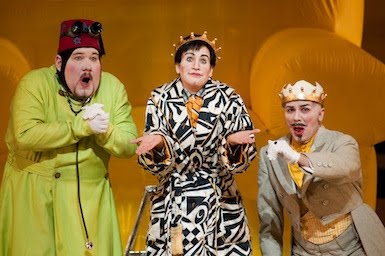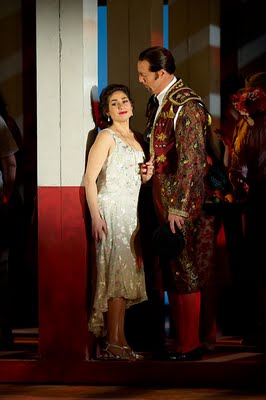by Frank Cadenhead
The annual four day conference of the music industry, MIDEM, finished in Cannes, France on January 27. While the state of the economy sapped some of the festive feeling from the meeting, new ways to promote music of all genres was a hot topic.
The evening concert on Tuesday January 26, the MIDEM Classical Awards, handed out prizes to 16 CDs and 3 DVDs from some 111 international labels from twenty countries. A special tribute was paid to composer Frederic Chopin, the bicentenary of his birth being celebrated this year. Master of Ceremonies were jointly James Jolly, editor of Gramophone Magazine, and the Canadian contralto Marie-Nicole Lemieux.
At the Auditorium Debussy at the Palais des Festivals, the concert featured the Cracow Sinfonietta, conducted by John Axelrod, along with the young virtuoso pianist Jan Lisiecki. The concert concluded their reading of the Polish composer's Piano Concerto No. 1. There were two special awards for this occasion: the "Best Ever" award was awarded to a recording of the Chopin Waltzes by Dinu Lipatti. In new recordings, pianist Nicolai Demidenko won the "Chopin Special Prize' for his recording of the Preludes on the label Onyx.
Italian soprano Mirella Freni was the object of a moving tribute and a standing ovation after received her "Lifetime Achievement" Award. The young clarinetist, José Franch-Ballester was named "Outstanding Young Artist" and played the Rhapsody for Clarinet and Orchestra by Debussy. The mezzo Elina Garanca and German baritone Christian Gerhaher were declared "Lyric Artists of the Year." They performed, respectively, the Habanera from Bizet's "Carmen" and Mahler's song "Ich hab’ ein glühend Messer." A high point of the evening was Marie-Nicole Lemieux's moving singing of "Chanson Triste" by Henri Duparc.
The MIDEM CLASSICAL AWARDS 2010:
EARLY MUSIC - Jérusalem, "La Ville des deux Paix" with Montserrat Figueras, La Capella Reial de Catalunya, Al-Darwish, Hesperion XXI, Jordi Savall (Alia Vox).
BAROQUE MUSIC - Telemann, "Brockes-Passion" with Birgitte Christensen, Lydia Teuscher, Marie-Claude Chappuis, Daniel Behle, Donát Havár, Johannes Weisser, the RIAS Kammerchor, the Akademie für Alte Musik Berlin, René Jacobs, conductor. (Harmonia Mundi).
VOCAL RECITALS - Handel - "Between Heaven & Earth" by soprano Sandrine Piau, Accademia Bizantina, Stefano Montanari (Naïve).
CHORAL WORKS - Zimmermann - "Requiem For A Young Poet" with Claudia Barainsky, David Pittman-Jennings, Lutz Lansemann, Michael Rotschopf, Jan Hage, João Rafael (Live Electronics), Czech Philharmonic Choir Brno, Slovac Philharmonic Choir, EuropaChorAkademie, Eric Vloeimans Quintet, Holland Symfonia, Bernhard Kontarsky (Cybele).
OPERA - Shostakovich - "The Nose" with Vladislav Sulimsky, Alexei Tanovitski, Tatiana Kravtsova, Andrei Popov, Sergei Semishkur, the Mariinsky Orchestra and Chorus, Valery Gergiev, conductor (Mariinsky).
SOLO INSTRUMENT - Paganini - 24 Capricci by Thomas Zehetmair (ECM)
CHAMBER MUSIC - Ravel, Debussy, Fauré String Quartets by the Quatuor Ebène (Virgin Classics).
CONCERTOS - Beethoven - "Piano Concertos No. 4 & No.°2 " by Ronald Brautigam, Norrköping Symphony Orchestra, Andrew Parrott (BIS).
SYMPHONIC WORKS - Mahler - Symphony No, 9 with the Bamberg Symphony, Jonathan Nott, conductor (Tudor).
CONTEMPORARY MUSIC - Messiaen, "The Works for Orchestra" by Roger Muraro, Yvonne Naef, EuropaChorAkademie, SWR Sinfonieorchester Baden-Baden und Freiburg, Sylvain Cambreling (Hänssler Classic).
FIRST RECORDING - Rigel, "Symphonies" by Concerto Köln (Berlin Classics).
HISTORICAL - Friedrich Gulda, "The Early Recordings" with Friedrich Gulda, piano, and the RIAS-Symphonie-Orchester Berlin, Igor Markevitch (Audite).
DVD: OPERA / BALLET - Tchaikovsky - Eugene Onegin par Mariusz Kwiecien, Tatiana Monogarova, Margarita Mamsirova, Andrey Dunaev, Anatolij Kotscherga, The Bolshoi Theatre Soloists, Chorus & Orchestra, Dmitri Tcherniakov, Chloé Perlemutter, Alexander Vedernikov (Bel Air Classiques).
DVD: CONCERTS - The King’s Singers' "Live at the BBC Proms" (Signum Records).
DVD: DOCUMENTARIES - "Sergiu Celibidache: You don’t do anything - You let it evolve." by Jan Schmidt-Garre (Arthaus Musik).
CLASSICAL DOWNLOAD - Classicsonline.com
OUTSTANDING YOUNG ARTIST (in cooperation with IAMA) - José Franch- Ballester.
JURY NOMINATION - Bach, "Six Solo Sonatas & Partitas" by violinist Viktoria Mullova (Onyx).
ARTIST OF THE YEAR – INSTRUMENTALIST - Angela Hewitt (piano).
ARTIST OF THE YEAR – FEMALE VOCALIST - Elīna Garanča (mezzo-soprano).
ARTIST OF THE YEAR – MALE VOCALIST - Christian Gerhaher (baritone).
LIFETIME ACHIEVEMENT - Mirella Freni (soprano).
LABEL OF THE YEAR - Naïve Classique.
RECORDING OF THE YEAR Zimmermann, "Requiem for a Young Poet" by Claudia Barainsky, David Pittman-Jennings, Lutz Lansemann, Michael Rotschopf, Jan Hage, João Rafael (Live Electronics), Czech Philharmonic Choir Brno, Slovac Philharmonic Choir, EuropaChorAkademie, Eric Vloeimans Quintet, Holland Symfonia, Bernhard Kontarsky (Cybele).
Labels: awards, MIDEM


 By L.H. Tiffany Hsieh
By L.H. Tiffany Hsieh